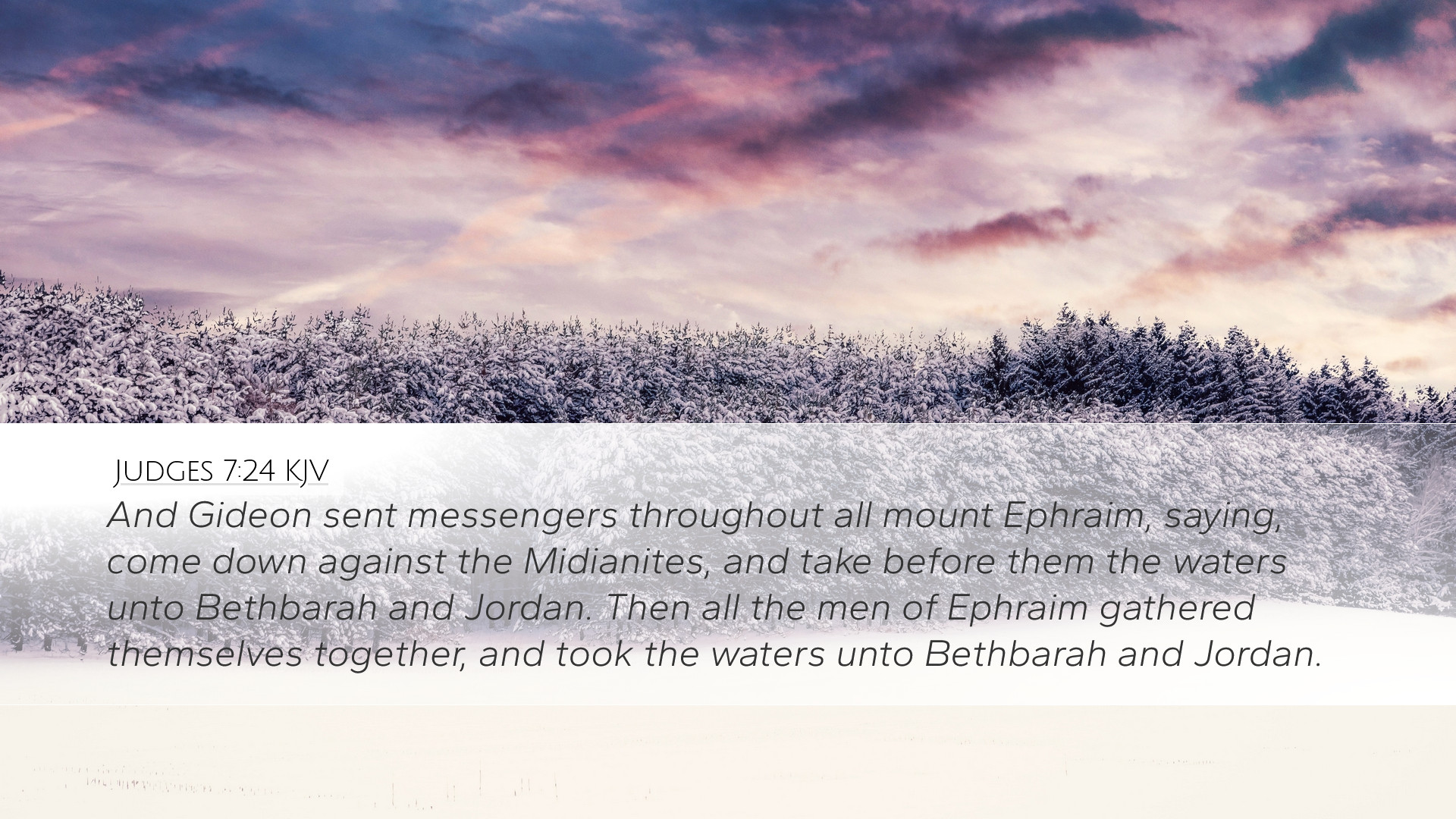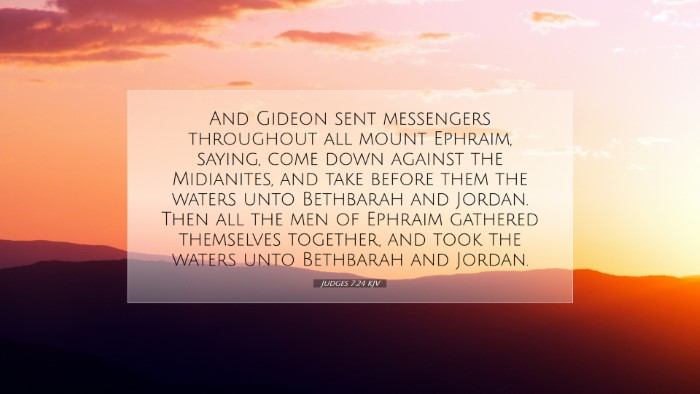Old Testament
Genesis Exodus Leviticus Numbers Deuteronomy Joshua Judges Ruth 1 Samuel 2 Samuel 1 Kings 2 Kings 1 Chronicles 2 Chronicles Ezra Nehemiah Esther Job Psalms Proverbs Ecclesiastes Song of Solomon Isaiah Jeremiah Lamentations Ezekiel Daniel Hosea Joel Amos Obadiah Jonah Micah Nahum Habakkuk Zephaniah Haggai Zechariah MalachiJudges 7:24
Judges 7:24 KJV
And Gideon sent messengers throughout all mount Ephraim, saying, come down against the Midianites, and take before them the waters unto Bethbarah and Jordan. Then all the men of Ephraim gathered themselves together, and took the waters unto Bethbarah and Jordan.
Judges 7:24 Bible Commentary
Commentary on Judges 7:24
Judges 7:24 states: "And Gideon sent messengers throughout all mount Ephraim, saying, Come down against the Midianites, and take before them the waters unto Bethbarah and Jordan. Then all the men of Ephraim gathered themselves together, and took the waters unto Bethbarah and Jordan."
This verse marks a pivotal moment in the narrative of Gideon's leadership and the Israelite campaign against the Midianites. Below, we explore insights from respected public domain commentaries, providing a rich tapestry of understanding for pastors, students, theologians, and Bible scholars.
Contextual Understanding
The verse occurs in the context of Gideon's victory over Midian, wherein God reduced Gideon's army to only 300 men to ensure that the victory would be attributed solely to Him. This leads to Gideon’s pursuit of the fleeing Midianites and the ensuing call to the men of Ephraim.
Matthew Henry's Commentary
Matthew Henry emphasizes the necessity of fellowship in battle. He remarks that Gideon recognizes the importance of uniting surrounding tribes in the struggle against their common enemy. The call to Ephraim signifies a cooperative spirit among the tribes of Israel, underscoring the idea that God's people must work together in times of crisis.
- The Role of Ephraim: Henry notes that Ephraim was a powerful tribe. Their engagement against the Midianites significantly aided Gideon's cause, reflecting the importance of combined efforts in spiritual warfare.
- The Symbolism of Water: The mention of waters at Bethbarah and the Jordan holds both geographical and spiritual connotations. Water often symbolizes life and provision, suggesting that controlling these waters is critical for sustaining and empowering the tribe.
Albert Barnes' Notes on the Bible
Barnes provides a more detailed examination of the geographical implications of this verse. He discusses how the waters mentioned are crucial to the logistical success of the Israelite forces and how they represent divine provision. His insights are as follows:
- Geopolitical Strategy: Barnes points out Gideon’s astuteness in choosing strategic locations to intercept the Midianites. This emphasizes the importance of discernment and wisdom in leadership.
- Implication of Urgency: The urgent call for action reflects the immediacy often required in spiritual warfare. Barnes encourages leaders to recognize moments of divine opportunity and act promptly.
Adam Clarke's Commentary
Adam Clarke brings a scholarly perspective, delving into the text's language and structure. He analyzes Gideon’s leadership style and exemplifies how it can be a model for contemporary leaders:
- Leadership Qualities: Clarke highlights Gideon’s qualities, noting his reliance on God and his ability to rally others to the cause. This serves as a critical lesson on the importance of divine guidance in leadership.
- Cultural Context: Clarke reflects on the historical context and the significance of inter-tribal collaboration for Israel’s success. Such collaboration is vital in the body of Christ today, illustrating the need for unity among diverse groups.
Theological Implications
Judges 7:24 illustrates several theological themes that resonate with modern readers:
- The Divine Strategy: The reduction of Gideon's army and the call to Ephraim highlight God's sovereignty in the affairs of men. It serves as a reminder that God's strategies may often defy human logic.
- Unity in Diversity: The cooperation among the tribes emphasizes the necessity of unity within the church. Just as various tribes collaborated against a common foe, believers must join forces against spiritual adversaries today.
- Stewardship of Resources: The control of water resources symbolizes the crucial aspect of resource management in ministry and mission. Leaders are called to be wise stewards of the gifts and resources provided by God.
Practical Applications
From the insights gleaned through these commentaries, several practical applications emerge for today's readers:
- Call to Action: Just as Gideon summoned Ephraim, church leaders should actively engage their communities, calling them to participate in the work of the Gospel.
- Pursuing God’s Will: Pastors and leaders are encouraged to seek God’s guidance in strategic decisions, recognizing that divine insight often leads to successful outcomes in ministry.
- Encouragement of Collaboration: Foster relationships within and outside the church that enable cooperation on common purposes, much like Gideon's collaboration with Ephraim.
Conclusion
Judges 7:24 is a profound verse that encapsulates themes of divine strategy, collaboration, and effective leadership. The insights from public domain commentaries affirm the necessity of unity and dependence on God for victory in both ancient and contemporary contexts. As we reflect on Gideon's leadership and his engagement with the tribe of Ephraim, may we be inspired to foster unity, seek divine guidance, and actively participate in the mission of God.


